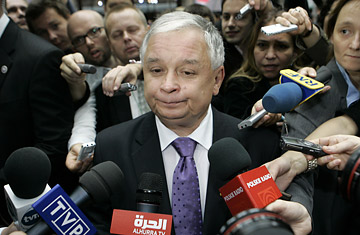
Poland's President Lech Kaczynski speaks with the media at an E.U. summit in Brussels
Is this the moment the European Union's ambitious climate change agenda unraveled? At the end of the two-day E.U. summit in Brussels Thursday, European leaders congratulated one another on their bold bank rescue plans. But the mutual backslapping might have provided perfect cover for a retreat from their long-standing commitment to reduce Europe's overall CO2 emissions by 20% by 2020, compared to 1990 levels.
Led by Poland, eight poorer Eastern European countries quietly but firmly said the emission cutting plans were too expensive. The eight are heavily reliant on coal and argue that they have achieved "the vast majority" of the E.U.'s CO2 reductions by shutting down heavily polluting old industrial plants in the 1990s.
Their concerns were echoed by Italian Prime Minister Silvio Berlusconi, who warned the financial burden of crashing markets and imminent recession had rendered the emissions targets unattainable. "We do not think that now is the time to be playing the role of Don Quixote, when the big producers of CO2, such as the United States or China, are totally against adherence to our targets," he said, promising to veto the deal.
A study released by the Open Europe think tank Monday estimates that the cost of the package as a whole will rise to almost $100 billion a year by 2020. Open Europe Research Director Hugo Robinson said the climate change plan "comes at exactly the wrong time for hard-pressed families all around Europe," and "will channel money towards very expensive and inefficient means of reducing CO2 emissions, imposing unnecessarily high costs on people struggling through already tough economic conditions."
Employers' lobby Business Europe added the chorus of grumbles, saying that "the heavy extra costs that are planned will hurt international competitiveness, especially for energy-intensive industries, and also hurt employment in those and associated industries."
The climate change plans were being questioned months ago as heavy industries complained about the burdens they would have to shoulder and the jobs that were under threat. But in the past month, as the global credit crunch struck Europe with a vengeance, many governments have raised concerns about whether they could afford the bailouts as well as the emissions commitments.
The Brussels summit did not formally decide anything on the climate change package: the 2020 target still remains a 20% cut in carbon emissions, a 20% boost in renewable energy, and a 20% rise in energy efficiency. But the mood has turned, and officials have backed away from pushing for details on how to achieve the cuts. E.U. governments and the European Parliament still have to agree them by December and turn them into law before next June's European elections.
Some leaders have insisted that the E.U. should not waver. French President Nicolas Sarkozy declared that the targets and timetable would be upheld, but offered "solutions" for those having trouble meeting them. "The climate package is so important that we cannot simply drop it, under the pretext of a financial crisis," he said. "If we scale back our ambitions then we count for nothing."
British Prime Minister Gordon Brown said that, despite the cost of going green, governments and citizens would save in the long run from the switch to cleaner energy. And European Commission President José Manuel Barroso warned that Europe was in danger of missing the big picture. "This is not a luxury we now have to forego," he said. "Climate change does not disappear because of the financial crisis."
But even if the E.U. can still honor the spirit of its climate change commitments, they might have to be scaled down, according to Simon Tilford, chief economist at the London-based Centre for European Reform (CER). "It was always going to be tough, but it is now much, much harder," he says. "It would be too pessimistic to say the whole agenda will be derailed. But it is difficult to see how it can be kept on track in its current form."
It may be premature to write off the EU's emissions program altogether. But if it does crumble over the next two months, the tipping point will have been the moment the E.U. finally got its act together on saving its troubled banks.
(Click here to see how Europe has undergone a metamorphosis due to changes in its climate.)
(Click here for a forecast of the effects of climate change by 2020.)
